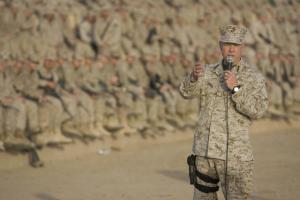While the Pentagon’s exhaustive study on integrating openly gay men and women into the military convinced President Obama, Defense Secretary Robert Gates, and Adm. Mike Mullen, chairman of the Joint Chiefs, of the wisdom of repealing “Don’t Ask, Don’t Tell” — a position each already held — it didn’t move the guys who actually have to lead the troops under any new policy. On Friday, the chiefs opposed to the change cited challenging conditions in Afghanistan as a key reason for their stance, just as Obama was visiting the country during a holiday trip to thanks U.S. troops there.

Marine Gen. James Amos / Dod photo
“I cannot reconcile, nor turn my back, on the negative perceptions held by our Marines who are most engaged in the hard work of day-to-day operations in Afghanistan,” Gen. James Amos, the Marine commandant, told the Senate Armed Services Committee. “We asked for their opinions, and they gave them to us. Their message to me is that the potential exists for disruption to the successful execution of our current combat mission should repeal be implemented at this time.” Amos said all he wants “is the opportunity to do that at a time of our choosing when my Marines aren’t singularly, tightly focused on what they’re doing in a very deadly environment.”
Three of the six senior military leaders testifying before the panel warned of dire consequences if the 17-year old ban is lifted now. Army Gen. George Casey and Air Force Gen. Norton Schwartz both said they could implement the change in their forces in the coming months, although they said they would rather not do so. “I would not recommend going forward at this time given everything the Army has on its plate,” Casey said. Schwartz said he would rather delay lifting the ban until 2012. Gen. James Cartwright, the vice chairman of the Joint Chiefs, Adm. Gary Roughead, the chief of naval operations, and Adm. Robert Papp, the Coast Guard commandant, all voiced support for repealing the gay ban.
(For language mavens: in their opening statements, three of the six officers used only the word “gay” or “gays” in discussing the issue; Amos only used the word “homosexual,” the other Marine, Cartwright, used both “gay” and “homosexual” and Navy chief Roughead managed to get through his entire statement without using either term. The American Psychological Association says that “the term homosexuality has been associated in the past with deviance, mental illness, and criminal behavior, and these negative stereotypes may be perpetuated by biased language.”)
The Pentagon’s nearly year-long review, released earlier this week, found that up to 60 percent of troops in all-male ground combat units are concerned about repealing the law, although throughout the force the level is half as high. Lawmakers who share the three chiefs’ chariness over the change quickly embraced their views as reason to keep the ban in place. Sen. John McCain of Arizona, the senior Republican on the panel, said the chiefs’ concerns about repealing the law means more time is needed to study the matter, including testimony from senior enlisted troops and combat commanders. That dims chances for a Senate vote ending the ban during its current lame-duck session (the House has already voted to lift it). Repeal will be even more difficult next year, after the GOP takes control of the House.


